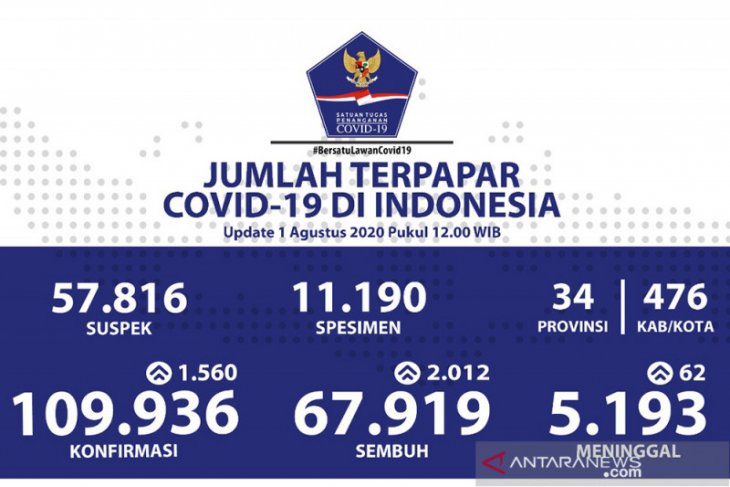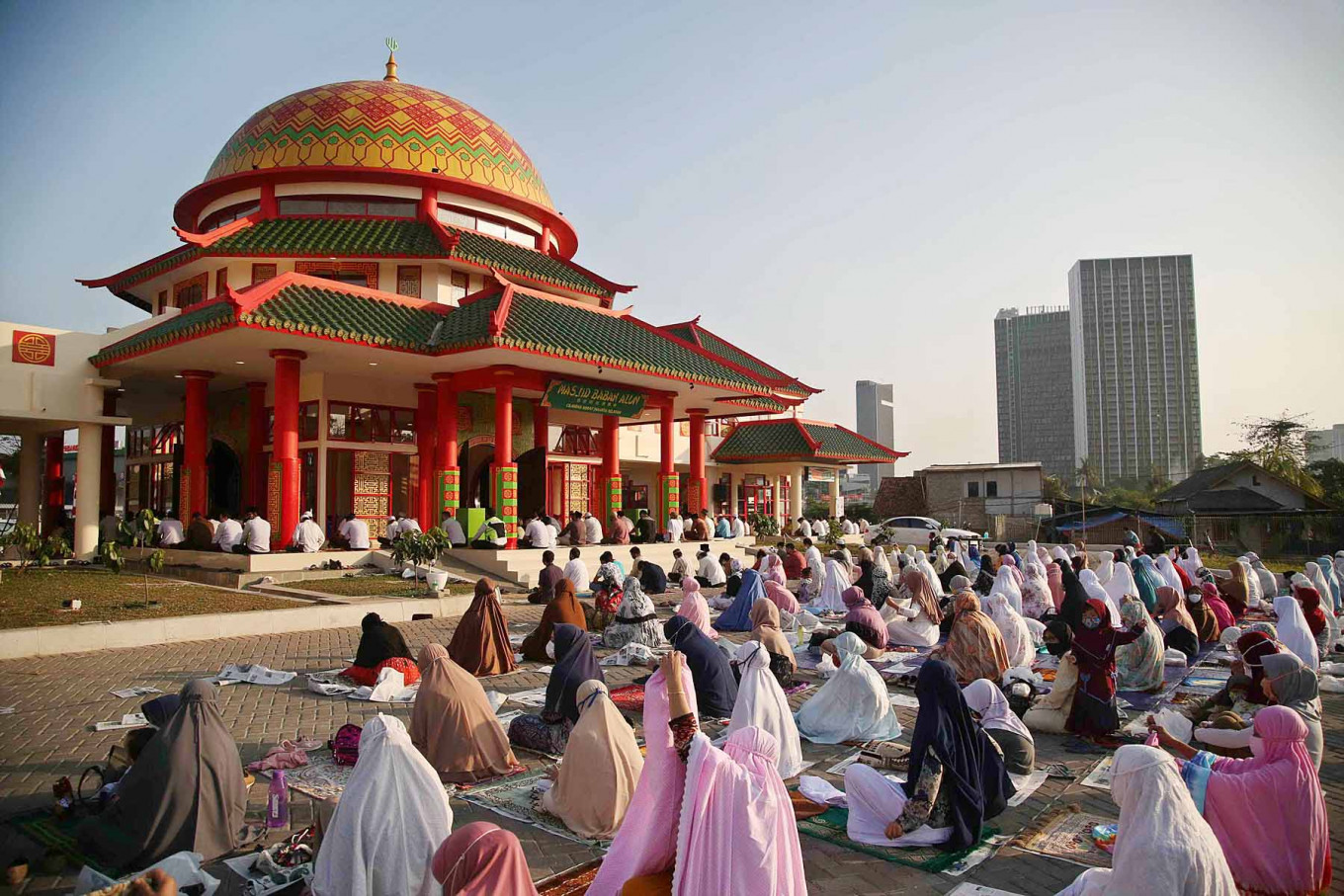Live Streaming
Program Highlight
Company Profile

Ani Hasanah
August

Indonesia recorded 1,560 fresh cases, while 2,012 people recovered from the coronavirus disease (COVID-19) on Saturday noon, August 1, 2020. (COVID-19 Handling Task Force)
Indonesia recorded 1,560 fresh cases, while 2,012 people recovered from the coronavirus disease (COVID-19) on Saturday noon, according to the COVID-19 Handling Task Force.
The country's tally of COVID-19 cases rose to 109,936, including a total of 67,919 recoveries since President Joko Widodo (Jokowi) made an announcement of Indonesia's first confirmed cases on March 2, 2020.
The number of people succumbing to COVID-19 surged by 62, thereby bringing the death toll to 5,193.
A total of 11,190 specimens from 9,355 people were examined at 320 laboratories across Indonesia on Saturday noon, thereby bringing the total number of specimens examined to 1,517,381 from 875,894 people.
Jakarta was the province, with the highest number of fresh cases, reaching 368; followed by 235 cases in East Java, 143 cases in Central Java, 142 cases in Gorontalo, and 130 cases in South Sulawesi.
Meanwhile, Jakarta emerged as the province, with the highest number of recoveries, reaching 679 people; followed by 462 people in East Java, 301 in Central Java, 131 in North Sumatra, and 82 in South Kalimantan.
The eight provinces of Aceh, Bangka Belitung, West Kalimantan, West Nusa Tenggara, West Sumatra, Central Sulawesi, Lampung, and East Nusa Tenggara reported no new confirmed cases.
The number of suspects still under monitoring reached 57,816, while 109,936 people were under surveillance.
The COVID-19 pandemic originated in Wuhan, China, in late 2019.
As of Saturday, a total of 17,793,829 people worldwide were infected with the virus, and the death toll had reached 683,797.
The coronavirus outbreak is affecting 213 countries and territories across the world and two international conveyances. (ANTARA)
Jokowi Telephonically Conveys Idul Adha Greetings to Saudi King Salman
President Joko Widodo (Jokowi) took the opportunity to telephonically convey Idul Adha greetings to Saudi Arabia's King Salman bin Abdulaziz Al Saud from the Bogor Presidential Palace, West Java, on Friday afternoon (July 31).
"I and the people of Indonesia wish Your Majesty the King and all people of Saudi Arabia Happy Eid Al-Adha 441 H," President Jokowi told King Salman Al Saud, as quoted in a government press statement issued here on Saturday.
The president echoed his contentment on the King’s recovery.
"I and all people of Indonesia pray that Majesty, the King, is always blessed with good health," he stated.
During the telephonic conversation, President Jokowi also lauded the Saudi Arabian government for holding the Hajj pilgrimage conducted on a limited basis this year in the wake of the COVID-19 pandemic.
"We also praise the arrangements made for the implementation of Hajj being conducted by applying strict health protocols and by promoting the health of people. Let us continue to pray that this pandemic can be quickly overcome," he emphasized.
Furthermore, President Jokowi expressed the Indonesian government’s keenness to intensify cooperation with the Government of Saudi Arabia to which King Salman responded positively.
"Mr. President, God Willing, we are always ready to intensify relations for the good of the two countries," King Salman told President Jokowi. King Salman was discharged from the hospital after a 10-day stay during which the 84-year-old leader underwent gall bladder removal surgery.
A video released late on Thursday by the Saudi state media showed the King walking steadily out of King Faisal Hospital in the capital, Riyadh, followed by several aides and his son, Crown Prince Mohammed bin Salman (MBS).
King Salman was admitted to the hospital on July 20 as he was suffering from inflammation of the gall bladder, according to the state media. (ANTARA)
August
Indonesia Urges People to 'come out of their homes' to Boost the Economy amid Covid-19

The Indonesian government has urged people to "come out of their homes" to boost the economy, warning that there are limits to what state coffers can do amid the Covid-19 pandemic.
"The economic activity has drastically been reduced, as many do not dare leave home, as they avoid meeting others physically. Meanwhile, virtual activities - in place of the usual physical contacts - have not adequately fuelled the economy," said Budi Sadikin, head of the economic recovery task force in the government's Covid-19 response team.
"If we continue to remain in (partial) lockdowns, our fiscal space would no longer be sustained," he added.
Budi's appeal on Wednesday (July 29) comes as it appears the country could be heading for a recession with a second quarter of negative growth. The forecast is for growth in the April to June quarter to be at least minus 3 per cent.
The government has set aside 695 trillion rupiah (S$66.8 billion), or about 4.2 per cent of the country's gross domestic product, to mitigate the impact of the pandemic which has led to millions of job losses.
Despite struggling to curb the spread of Covid-19, cities and provinces across the sprawling archipelago have gradually eased restrictive measures imposed as part of partial lockdowns. The world's fourth-most populous country, with 270 million people, declared its first infections in early March.
The overall number of infections in Indonesia totalled 104,432 as of Wednesday, with fatalities reaching 4,975. Both figures are the highest in South-East Asia.
Offices in the capital of Jakarta started to reopen in the first week of June, with workers put on a staggered roster and going to the office on alternate days. They have also been told to avoid crowding at meal times and in lifts. Shopping malls were also allowed to reopen in mid-June.
Bali, Indonesia's tourism hot spot, is due to reopen on Friday to domestic tourists and to foreign tourists possibly on Sept 11.
A slew of strict protocols has been put in place, including requiring visitors to show proof that they tested negative for Covid-19. would be required. The planned reopening to foreign tourists is subject to approval from Jakarta.
While stressing the need for strict health safeguards, Budi on Wednesday reassured people about going about their normal business.
"Doctors today know better how to treat patients, so chances of recovery have much improved. They have higher therapeutic standards, health protocol standards and antiviral drugs are widely available," he said.
"A hundred years ago, 100 per cent of dengue patients didn't make it. Today, if we get dengue, we may recover. This is not because of a vaccine, but better therapeutic standards," he added.
Government data shows the recovery rate of Covid-19 patients in the country rising to above 40 per cent in July, from 37 per cent, 22 per cent, 10 per cent and 4 per cent in the previous four months respectively.
Epidemiologist Pandu Riono, who teaches at the faculty of public health at the University of Indonesia, remained sceptical about encouraging people to enter a "new normal", saying that this could only be possible with increased surveillance and strict health protocols - the wearing of a mask, frequent hand washing and social distancing - in place.
"Key to surveillance is massive testing, contact tracing and isolating cases. We need to have 100,000 tests per day to contain the pandemic. If we don't achieve this, we may still see cases climb next year," Dr Pandu told The Straits Times.
Between 20,000 and 30,000 polymerase chain reaction (PCR) tests are currently taken every day. (The New Straits Times/Asian News Network)
August
Tests Reveal Increase in COVID-19 Clusters in Jakarta's Houses of Worship

Praying under protocol: Muslims attend an Idul Adha (Day of Sacrifice) prayer at Babah Alun Mosque in Cilandak, South Jakarta, on July 31. (JP/P.J. Leo)
More than half of the people tested for COVID-19 at houses of worship were found to have the disease, health authorities have revealed.
According to epidemiologist Dewi Nur Aisyah of the national COVID-19 task force, the positivity rate in houses of worship has reached 74 percent, up from 51 percent, tempo.co reported.
The positivity rate refers to the percentage of positive results of from all tests conducted in a cluster.
Jakarta Health Agency data from June 4 to July 28 shows there were 114 confirmed cases from nine houses of worship clusters across the capital. Most of them were located in churches and mosques, with three clusters each and a total of 40 cases.
Meanwhile, health authorities recorded one cluster in a clergy dormitory, pesantren [Islamic boarding school] and tahlil (Islamic prayers of the dead), with a total of 74 cases.
“The positivity rate likely [increased] because people kept gathering in one place, such as in a clergy dormitory,” Dewi said on Friday as quoted by tempo.co.
During its transition from large-scale social restrictions (PSBB), the capital determined five types of COVID-19 clusters, namely houses of worship, residential areas, markets, office and health facilities.
Governor Anies Baswedan extended the transitional PSBB for another two weeks starting on Friday after Jakarta failed to slow down the daily increase in COVID-19 cases. The capital’s positivity rate hit 6.5 percent in the past week, above the figure recommended by the World Health Organization for relaxations, which is 5 percent or below.
The city’s latest COVID-19 daily reproduction number (Rt) also stood at 1. An outbreak is considered under control if the number is below 1. (aly) (The Jakarta Post)


